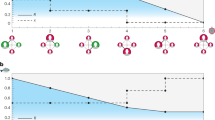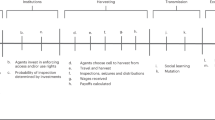Abstract
We test how fast and slow thought processes affect cooperation for sustainability by manipulating time pressure in a dynamic common-pool resource experiment. Sustainable management of shared resources critically depends on decisions in the current period to leave enough stock so that future generations are able to draw on the remaining limited natural resources. An intertemporal common-pool resource game represents a typical dynamic for social dilemmas involving natural resources. Using one such game, we analyse decisions throughout time. We find that people in this context deplete the common resource to a greater extent under time pressure, which leads to greater likelihood of stock collapse. Preventing resource collapse while managing natural resources requires actively creating decision environments that facilitate the cognitive capacity needed to support sustainable cooperation.
This is a preview of subscription content, access via your institution
Access options
Access Nature and 54 other Nature Portfolio journals
Get Nature+, our best-value online-access subscription
$29.99 / 30 days
cancel any time
Subscribe to this journal
Receive 12 digital issues and online access to articles
$119.00 per year
only $9.92 per issue
Buy this article
- Purchase on Springer Link
- Instant access to full article PDF
Prices may be subject to local taxes which are calculated during checkout

Similar content being viewed by others
References
Brown, B. J., Hanson, M. E., Liverman, D. M. & Merideth, R. W. Global sustainability: toward definition. Environ. Manag. 11, 713–719 (1987).
Pearson, C. S Down to Business: Multinational Corporations, the Environment and Development. (World Resources Institute: Washington DC, 1985).
Rand, D. G. et al. Social heuristics shape intuitive cooperation. Nat. Commun. 5, 3677 (2014).
Bear, A. & Rand, D. G. Intuition, deliberation, and the evolution of cooperation. Proc. Natl Acad. Sci. USA 113, 936–941 (2016).
Clutton-Brock, T. Cooperation between non-kin in animal societies. Nature 462, 51–57 (2009).
Vollan, B. & Ostrom, E. Cooperation and the commons. Science 330, 923–924 (2010).
Van Lange, P., Van Vugt, M. & De Cremer, D. in Cooperation in Modern Society: Promoting the Welfare of Communities, States and Organizations (eds Van Vugt, M., Snyder, M., et al.) 45–63 (Routledge, New York, NY, 2000).
Jentoft, S., Onyango, P. & Islam, M. M. Freedom and poverty in the fishery commons. Int. J. Commons 4, 345–366 (2010).
Ostrom, E. The challenge of common-pool resources. Environment 50, 8–20 (2010).
Ostrom, E. Governing the Commons: The Evolution of Institutions for Collective Action (Cambridge Univ. Press: Cambridge, 1990).
Rustagi, D., Engel, S. & Kosfeld, M. Conditional cooperation and costly monitoring explain success in forest commons management. Science 330, 961–965 (2010).
Hauser, O. P., Rand, D. G., Peysakhovich, A. & Nowak, M. A. Cooperating with the future. Nature 511, 220–223 (2014).
Jabareen, Y. A new conceptual framework for sustainable development. Environ., Dev. Sustain. 10, 179–192 (2008).
Clark, W. C. & Dickson, N. M. Sustainability science: the emerging research program. Proc. Natl Acad. Sci. USA 100, 8059–8061 (2003).
Lindner, F. & Rose, J. No need for more time: intertemporal allocation decisions under time pressure. J. Econ. Psychol. 60, 53–70 (2017).
Mani, A., Mullainathan, S., Shafir, E. & Zhao, J. Poverty impedes cognitive function. Science 341, 976–980 (2013).
Lichand, G. & Mani, A. Cognitive Droughts Working Paper (Competitive Advantage in the Global Economy, 2016); https://scholar.harvard.edu/glichand/publications/cognitive-droughts
Mullainathan, S. & Shafir, E. Freeing up intelligence. Sci. Am. Mind 25, 58–63 (2014).
Shah, A. K., Mullainathan, S. & Shafir, E. Some consequences of having too little. Science 338, 682–685 (2012).
Shah, A. K., Shafir, E. & Mullainathan, S. Scarcity frames value. Psychol. Sci. 26, 402–412 (2015).
Barrett, C. B., Garg, T. & McBride, L. Well-being dynamics and poverty traps. Ann. Rev. Res Econ. 8, 303–327 (2016).
Wright, P. The harassed decision maker: time pressures, distractions, and the use of evidence. J. Appl. Psychol. 59, 555–561 (1974).
MacGregor, D. in Time Pressure and Stress in Human Judgment and Decision Making (eds Svenson, O. & Maule, A. J.) 73–82 (Springer, New York, NY, 1993).
Edland, A. in Time Pressure and Stress in Human Judgment and Decision Making (eds Svenson, O. & Maule, A. J.) 145–156 (Springer, New York, NY, 1993).
Svenson, O. & Benson, L. III in Time Pressure and Stress in Human Judgment and Decision Making (eds Svenson, O. & Maule, A. J.) 133–144 (Springer, New York, NY, 1993).
Sloman, S. A. The empirical case for two systems of reasoning. Psychol. Bull. 119, 3–27 (1996).
Rand, D. G., Greene, J. D. & Nowak, M. A. Spontaneous giving and calculated greed. Nature 489, 427–430 (2012).
Rand, D. G. & Kraft-Todd, G. T. Reflection does not undermine self-interested prosociality. Front. Behav. Neurosci. 8, 1–8 (2014).
Achtziger, A., Alós-Ferrer, C. & Wagner, A. Social Preferences and Self-Control Working Paper (2011); http://wagnerak.com/files/UG_Germany_2017May12.pdf
Rand, D. G. Cooperation, fast and slow: meta-analytic evidence for a theory of social heuristics and self-interested deliberation. Psychol. Sci. 27, 1192–1206 (2016).
Bear, A., Kagan, A. & Rand, D. G. Co-evolution of cooperation and cognition: the impact of imperfect deliberation and context-sensitive intuition. Proc. R. Soc. B 284, 20162326 (2017).
Jagau, S. & van Veelen, M. A general evolutionary framework for the role of intuition and deliberation in cooperation. Nat. Hum. Behav. 1, 0152 (2017).
Goeschl, T. & Lohse, J. Cooperation in public good games. Calculated or confused? Discussion Paper Series No. 626 (Univ. Heidelberg, Department of Economics, 2016).
Hahn, M., Lawson, R. & Lee, Y. G. The effects of time pressure and information load on decision quality. Psychol. Mark. 9, 365–378 (1992).
Kocher, M. G. & Sutter, M. Time is money-time pressure, incentives, and the quality of decision-making. J. Econ. Behav. Organ. 61, 375–392 (2006).
Alós-Ferrer, C., Hügelschäfer, S. & Li, J. Inertia and decision making. Front. Psychol. https://doi.org/10.3389/fpsyg.2016.00169 (2016).
Janssen, M. Introducing ecological dynamics into common-pool resource experiments. Ecol. Soc. 15, (2010).
Ostrom, E., Gardner, R. & Walker, J. Rules, Games, and Common-Pool Resources (Univ. Michigan Press, Ann Arbor, MI, 1994).
Kimbrough, E. O. & Vostroknutov, A. The social and ecological determinants of common pool resource sustainability. J. Environ. Econ. Manag. 72, 38–53 (2015).
Huggett, A. J. The concept and utility of ‘ecological thresholds’ in biodiversity conservation. Biol. Conserv. 124, 301–310 (2005).
Cox, D. R. Regression models and life-tables. J. R. Stat. Soc. B 34, 187–220 (1972).
Etzioni, R. D. On the use of survival analysis techniques to estimate medical care costs. J. Health Econ. 18, 365–380 (1999).
Box-Steffensmeier, J. M. & Zorn, C. J. W. Duration models and proportional hazards in political science. Am. J. Polit. Sci. 45, 972–988 (2001).
Singer, J. D. & Willett, J. B. It’s about time: using discrete-time survival analysis to study duration and the timing of events. J. Educ. Stat. 18, 155–195 (1993).
Fudenberg, D. & Maskin, E. The folk theorem in repeated games with discounting or with incomplete information. Econometrica 54, 533–554 (1986).
Ostrom, E., Walker, J. & Gardner, R. Covenants with and without a sword: self-governance is possible. Am. Polit. Sci. Rev. 86, 404–417 (1992).
Fischbacher, U. z-Tree: Zurich toolbox for ready-made economic experiments. Exp. Econ. 10, 171–178 (2007).
Frederick, S. Cognitive reflection and decision making. J. Econ. Perspect. 19, 25–42 (2005).
Acknowledgements
We thank D. Rand, L. Putterman, A. Alonso, A. Gold, S. Ventz and T. Sproul for helpful comments on this work and C.A. Gill for research assistance. This work was supported by the United States Department of Agriculture National Institute of Food and Agriculture, Hatch project 1005053 and the RI Water Resources Center.
Author information
Authors and Affiliations
Contributions
All authors contributed to the writing of the manuscript. T.G. and C.B. designed the experiment and analysed the data.
Corresponding author
Ethics declarations
Competing interests
The authors declare no competing interests.
Additional information
Publisher’s note: Springer Nature remains neutral with regard to jurisdictional claims in published maps and institutional affiliations.
Supplementary information
Supplementary Information
Supplementary Methods, Discussion, Tables 1–4, Figs. 1–4
Rights and permissions
About this article
Cite this article
Brozyna, C., Guilfoos, T. & Atlas, S. Slow and deliberate cooperation in the commons. Nat Sustain 1, 184–189 (2018). https://doi.org/10.1038/s41893-018-0050-z
Received:
Accepted:
Published:
Issue Date:
DOI: https://doi.org/10.1038/s41893-018-0050-z
This article is cited by
-
Does similarity trigger cooperation? Dyadic effect of similarity in social value orientation and cognitive resources on cooperation
Current Psychology (2023)
-
Academics and the ‘easy button’: lessons from pesticide resistance management
Agriculture and Human Values (2022)
-
Groups discipline resource use under scarcity
Theory and Decision (2022)
-
Cooperating with the future through natural resources restoration
Sustainability Science (2021)
-
The critical role of second-order normative beliefs in predicting energy conservation
Nature Human Behaviour (2018)



